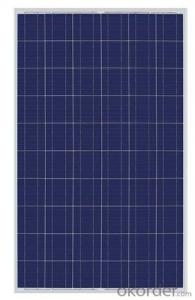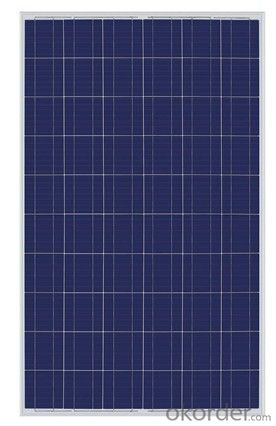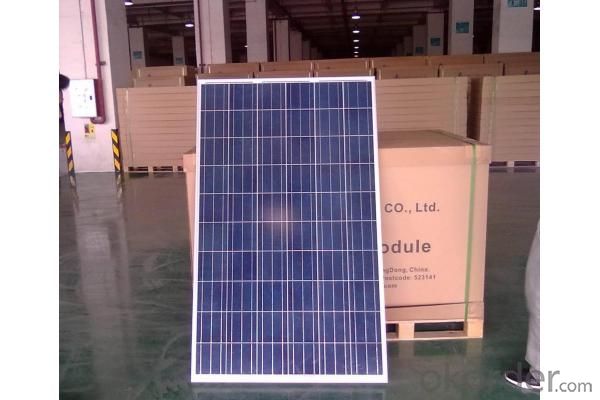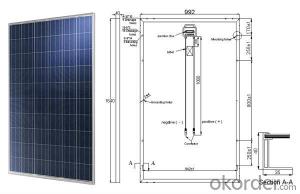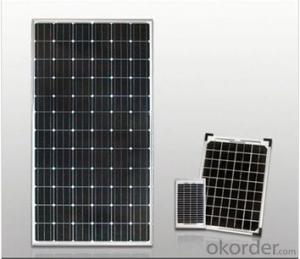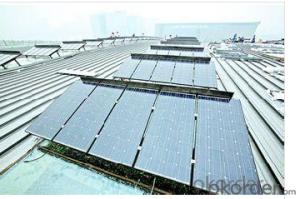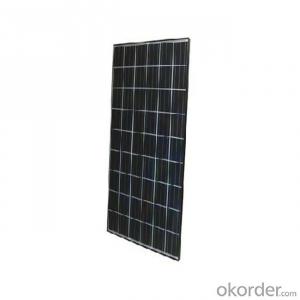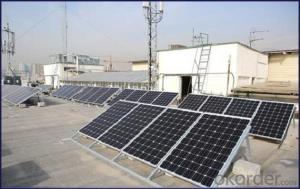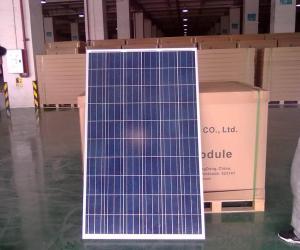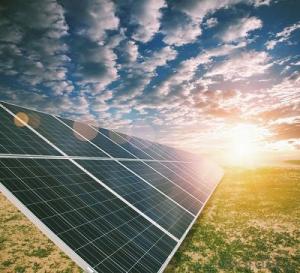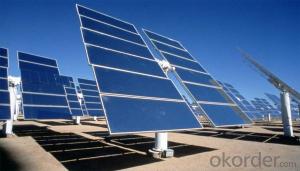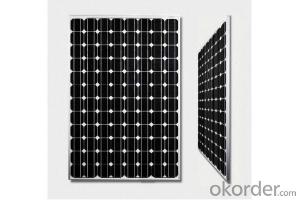1KW Solar Panels - CE and TUV Approved 110W Poly Solar Panel
- Loading Port:
- Shanghai
- Payment Terms:
- TT OR LC
- Min Order Qty:
- 10000 watt
- Supply Capability:
- 20000000 watt/month
OKorder Service Pledge
OKorder Financial Service
You Might Also Like
Specification
1. The Introduction of Solar Module
Solar modules use light energy from the sun to generate electricity through the photovoltaic effect. The majority of modules use wafer-based crystalline silicon cells or thin-film cells based on cadmium telluride or silicon. The structural (load carrying) member of a module can either be the top layer or the back layer. Cells must also be protected from mechanical damage and moisture. Most solar modules are rigid, but semi-flexible ones are available, based on thin-film cells.
2.Technical Parameter
Type | CNBM Solar Polycrystalline Series |
Materials | Silicon |
Guarantee | 12 yrs free from defects in materials and workmanship No less than 90% within 10yrs and no less than 80% within 25yrs TUV(IEC61215&IEC61730), CE, UL |
Application | Photovoltaic/ solar/ green energy/ energy saving |
Descriptions | 1.High efficiency crystalline silicon solar cell. Even if under the weak light, the solar module can produce maximum power output. 2.Tempered glass (toughened glass): Anti-reflecting coating and high transmission rate glass increase the power output and mechanical strength of solar module. 3. EVA and TPT: Using high quality EVA and TPT to prevent destroying and water. 4. AI frame: Without screw, rner connection. 6 holes on the frame can be installed easily. 5. Junction box: Multi function junction box with water proof. 6. Long lifetime: ≥25 years; Less power decrease. 7. Good performance of preventing from atrocious weather such as wind and hails. 8. Resisting moisture and etching effectively, not effected by geology. 9. The certificate issued by international authority: UL, TUV, IEC, CE.
|
Packaging Details: | 26pcs/pallet, 28pallets/ 40HQ Our solar panels are packed in cartons, and then pallet. Shipping by sea or by air are both ok, it up to customer’s chose. We’d like to inquiry the freight cost for customer after be informed exact quantity and destination address. |
3. Application and Pictures of Products
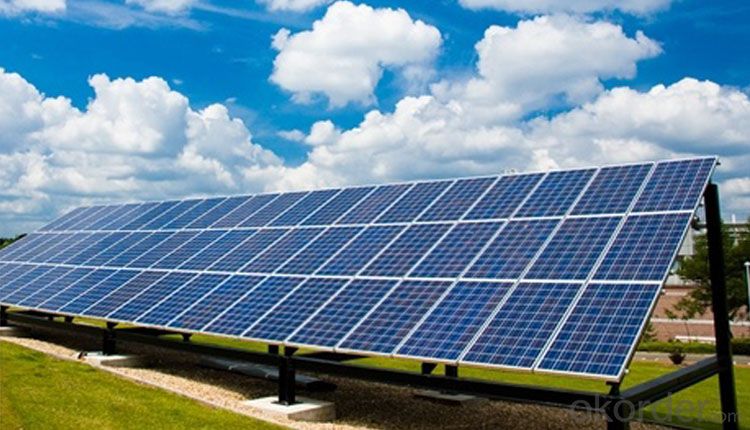
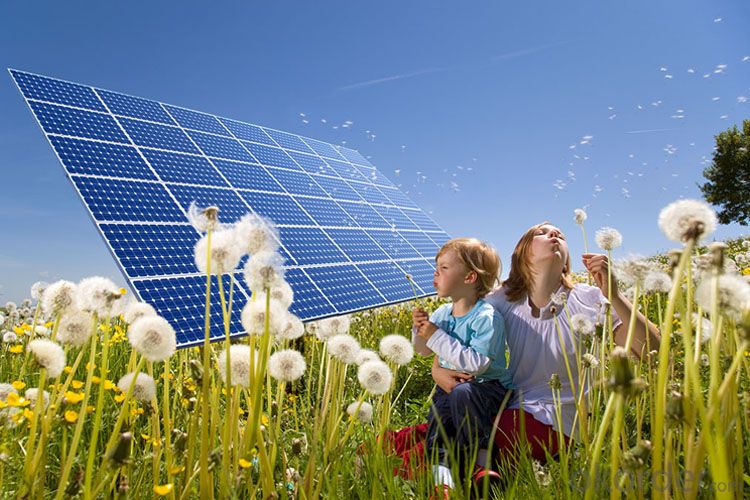
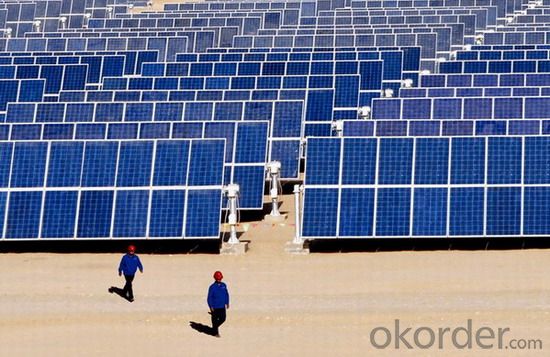
4. How to Work
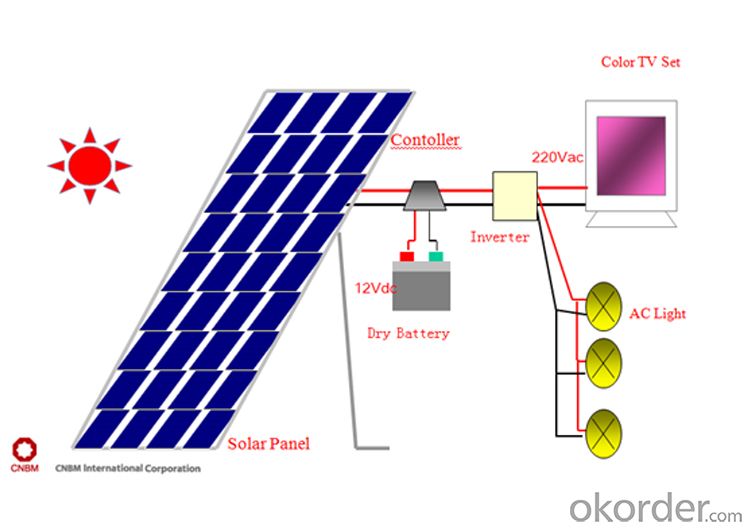
5. Packing Details
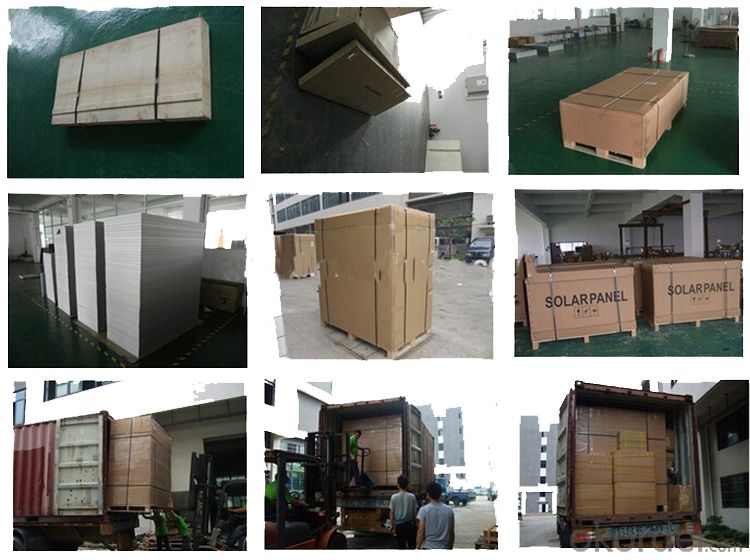
6. FAQ
Q1: What is the business type for the company?
A1: We are one of the biggest manufacturers in zhejiang.Chnia. Which is a high tech PV enterprise dedicated to the research, development, production and sales..
Q2: How long solar panel warranty can you offer?
A2: 10-Year product warranty,25-year linear power output warranty
If there is any quality problem, we will pay for freight and send free parts to you.
Q3: How many certificates do you have?
A3: We have 16 certificates,such as CE, TUV, UL, and so on.
- Q: I would like to know of any construction companies, road crews, or any company that uses solar panels in the Tampa area and throws them away. I like to recycle solar panels by repairing and processing what power I can from them. Know any companies that throw out used solar panels? If so, can you provide the name and number?
- Check out home power magazine for the list of vender's. Construction companies typically return damaged panels to the distributor or manufacturer for credit. The companies may have an inventory of goods for sale. Also, check out large insurance companies (Nationwide) to see what they do with panels they write off as catastrophic loss when a homeowner or business files a claim. Hope this helps
- Q: Can solar panels be used for powering water treatment plants?
- Yes, solar panels can be used for powering water treatment plants. Solar energy can be harnessed and converted into electricity to operate the various processes involved in water treatment, such as filtration, disinfection, and pumping. This renewable energy source can help reduce reliance on fossil fuels, lower operational costs, and contribute to a more sustainable and environmentally-friendly water treatment process.
- Q: How do solar panels impact wildlife?
- Solar panels have a minimal impact on wildlife compared to other energy sources. While some concerns exist regarding the potential for bird collisions and habitat disruption during installation, these impacts are relatively low and can be mitigated through proper siting and design. Additionally, the reduction in greenhouse gas emissions achieved by solar panels benefits wildlife by combating climate change and preserving their natural habitats.
- Q: If my school uses 88240kWh of electricity per month and I have 000 50W solar panels running for 6 hours a day, does it mean it will take 88240kWh / {{[(50W x 3600s)*000]/000}kWh x 6} number of hours to generate that much electricity (88240kWh)?
- your first question: Does a 50W solar panel generate 540kWh? 540 kW-hr / 50W = 3600 hours it would take that long for the panel to generate that amount of energy. your second question is confused, as you both stipulate the number of hours at 6 hours per day, and you try to solve for the number of hours. 000 x 50w = 50 kW 50 kW x 6 hr/day x 30 day/mo = 27000 kW-hr/mo = 27 MW-hr/mo that is the amount of energy generated. That is nowhere close to 88240 kWh or 88 MW-hr. I would take 7 times more solar panels to generate that much energy. .
- Q: our school spends around $0,000 dollars on energy.we want to know how much money would installing solar panels on the roof save our school.
- even although photograph voltaic panels cost quite some funds up front and don't furnish a hundred% performance, over the existence of the device, a photo voltaic panel array can shop maximum folk funds. producers furnish 25 365 days production guarantee on panels and panels will often proceed to supply after the guaranty has expired. whilst a device is designed to supply 'internet metering' truly producing as a lot power a house makes use of it (the two by way of batteries or pushing it back on the grid the payback on the cost of the panels would be measured by way of dividing the device cost by way of the month-to-month power expenses. With the passage of a 30% federal tax credit on qualified platforms and assorted state classes, platforms will payback often in under a decade consistent with utilization factors and climate.
- Q: Can solar panels be installed on water pumps?
- Yes, solar panels can be installed on water pumps. Solar-powered water pumps are becoming increasingly popular and are a sustainable solution for providing water in remote areas or off-grid locations. These pumps use solar energy to power their operation, making them environmentally friendly and cost-effective in the long run.
- Q: Dont/Cant work alone?when you buya asolar panel you mUST GET bATTERIES, voltage regulators and many else stuff?cant they just work directly? or can i use normal batteres like Car batteries?The one who Really knows 0 pts. thanks
- Solar okorder /
- Q: Can solar panels be installed on historical landmarks?
- Yes, solar panels can be installed on historical landmarks. However, it is important to ensure that the installation is done in a manner that preserves the historical integrity and aesthetic value of the landmark. This may involve careful planning, consultation with preservation experts, and using discreet or integrated solar panel designs.
- Q: What is the working principle of solar panels?
- the material is easy to industrial production and material performance and stability.
- Q: Can solar panels be used in areas with high levels of noise from transportation?
- Yes, solar panels can be used in areas with high levels of noise from transportation. Noise pollution does not directly affect the functionality of solar panels as they primarily rely on sunlight to generate electricity. However, it is important to ensure that the installation of solar panels is done properly to avoid any physical damage caused by vibrations or other factors associated with transportation noise.
Send your message to us
1KW Solar Panels - CE and TUV Approved 110W Poly Solar Panel
- Loading Port:
- Shanghai
- Payment Terms:
- TT OR LC
- Min Order Qty:
- 10000 watt
- Supply Capability:
- 20000000 watt/month
OKorder Service Pledge
OKorder Financial Service
Similar products
Hot products
Hot Searches
Related keywords
